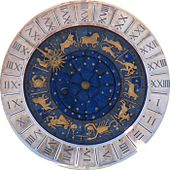
Back রাশিফলক জ্যোতিষশাস্ত্র Bengali/Bangla Astrología de horóscopos Spanish طالعبینی زایچه Persian 천궁도 점성술 Korean Fanandroana hôrôskôpika Malagasy
| Astrology |
|---|
 |
| Background |
| Traditions |
| Branches |
| Astrological signs |
| Symbols |
Horoscopic astrology is a form of astrology that uses a horoscope, a visual representation of the heavens, for a specific moment in time to interpret the purported meaning behind the alignment of the planets at that moment. The idea is that the placement of the planets at any given moment in time supposedly reflects the nature of that moment and especially anything that is born then, and proponents claim that this can be analyzed using the chart and a variety of rules for interpreting the "language" or symbols therein.
One of the defining characteristics of this form of astrology that makes it distinct from other traditions is the computation of the degree of the Eastern horizon rising against the backdrop of the ecliptic at the specific moment under examination, known as the ascendant. As a general rule, any system of astrology that does not use the ascendant does not fall under the category of horoscopic astrology, although there are some exceptions.[citation needed]
Modern scientific perspectives on the nature of celestial objects have disproven the theoretical basis for horoscopic astrology,[1]: 85, [2]: 424 and astrology have been recognized as a form of pseudoscience since the 18th century.[3]
- ^ Jeffrey Bennett; Megan Donohue; Nicholas Schneider; Mark Voit (2007). The cosmic perspective (4th ed.). San Francisco, CA: Pearson/Addison-Wesley. pp. 82–84. ISBN 0-8053-9283-1.[1]
- ^ Zarka, Philippe (2011). "Astronomy and astrology" (PDF). Proceedings of the International Astronomical Union. 5 (S260): 420–425. doi:10.1017/S1743921311002602.
- ^
- Hanegraaff, Wouter J. (2012). Esotericism and the Academy: Rejected Knowledge in Western Culture. Cambridge: Cambridge University Press. p. 171. ISBN 978-0-521-19621-5.
- Long, H. S. (2003). "Astrology". In Carson, Thomas; Cerrito, Joann (eds.). New Catholic Encyclopedia. Vol. 1 (2nd ed.). Thomson/Gale. pp. 811–813. ISBN 0-7876-4005-0. p. 811.
- Thagard, Paul R. (1978). "Why Astrology is a Pseudoscience" (PDF). Proceedings of the Biennial Meeting of the Philosophy of Science Association. 1. The University of Chicago Press: 229. doi:10.1086/psaprocbienmeetp.1978.1.192639. JSTOR 192639. S2CID 147050929. Archived (PDF) from the original on 2022-10-09.
© MMXXIII Rich X Search. We shall prevail. All rights reserved. Rich X Search